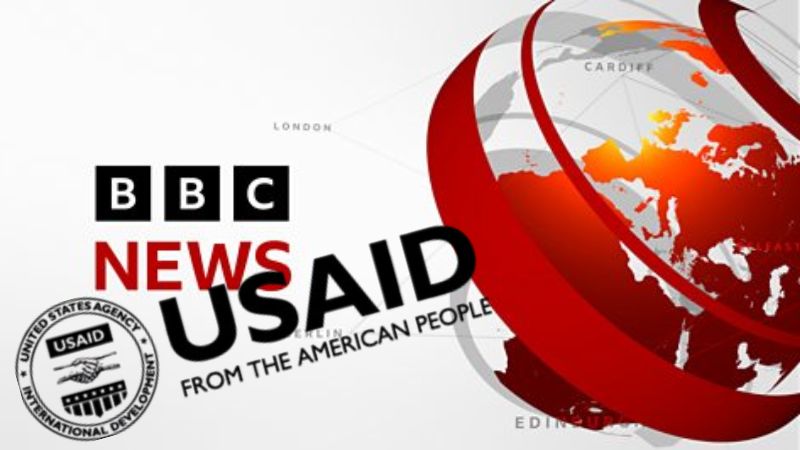It was on the 8th of October last year, that the Prime Minister of India, Narendra Modi cautioned the people of India of there being foreign powers who are trying to conspire against India.
“For some time now, many conspiracies are being hatched against India. Many conspiracies are being hatched to weaken India’s democracy and social fabric”, he stated while addressing the crowd during his Haryana election victory speech. With new developments getting uncovered everyday, it seems the Indian Prime Minister was spot on in his claim.
At the latest, the funding source for the United Kingdom’s state-owned broadcaste BBC has brought forth shocking revelations. The findings showed the connection between the so-called independent, unbiased media and USAID, which is currently embroiled in major controversy involving siphoning large sums of funds to fuel unrest, carry out extraterritorial activities and the notorious colour revolution, aka regime change operations.
According to the funding source for the BBC, which is often touted as an independent media organisation, UK’s state-owned broadcaster receives substantial funding from foreign governments, with the United States Agency for International Development (USAID) emerging as one of its major backers.
In 2023-24 alone, BBC Media Action, the broadcaster’s international development arm, received a staggering £2.6 million from USAID, making it one of the largest contributors to its operations. Co-Founder of Tesla Elon Musk who is a close ally of the current Trump administration also took to twitter to call BBC a state funded media. “BBC is literally state-funded media”, he wrote.
BBC is literally state-funded media https://t.co/wFoQ8GcETm
— Elon Musk (@elonmusk) February 4, 2025
Found out today that USAID funds the BBC
WTF? pic.twitter.com/UW1j4N2gA1
— Basil the Great (@Basil_TGMD) February 4, 2025
Despite its claims of editorial independence, BBC Media Action is heavily reliant on institutional donors, which explains its potential external influence over its content and narratives. Alongside USAID, other major donors included the UK Foreign, Commonwealth & Development Office (FCDO) (£3 million), the Swedish International Development Cooperation Agency (Sida) (£1.6 million), and the European Commission (£1.3 million). The significant involvement of BBC with USAID, an agency which has a history of political interference in countries under the guise of promoting democracy and providing aid, showcases a clear picture behind BBC’s biased reporting.
BBC’s relationship with the Indian state too has been problematic, which TFI has been extensively exposing from time to time. Currently, a thread shared by an X user named @OSINTWa_com is going viral on social media where the handle has brought attention to consistent pattern of biased reporting by BBC, particularly in relation to India.
The user highlights that the BBC often distorts facts and presents skewed narratives on sensitive issues like the Citizenship (Amendment) Act (CAA), Article 370, the Khalistani movement, and India’s pharmaceutical industry. BBC’s biased portrayals have contributed to a misleading and negative image of India internationally.
Beyond the Bias- With this new series we are going to expose global media’s propaganda against India.
Starting with the BBC.
BBC is one usual offender with a long history of peddling biased narratives when it comes to reporting on India—from CAA, Article 370 & Kashmir etc.
— OSINTवा (@OSINTWa_com) January 30, 2025
In its coverage of the CAA, the BBC misrepresented the law, branded it “anti-Muslim” despite its intent to offer refuge to persecuted minorities from neighboring countries. Similarly, the coverage of the Delhi riots following the CAA protests downplayed the violence initiated by Islamists and put its editorial weight to portray the government as oppressive.
Furthermore, the BBC’s reporting on the abrogation of Article 370, which integrated Jammu and Kashmir into India, was also biased and anti-India. BBC’s portrayal of the move as driven by Hindu nationalist ideology ignored the Indian government’s efforts to foster peace and curb terrorism in the region. Additionally, the BBC’s approach to the Khalistani movement downplayed its violent nature by using terms like “Sikh activists” to refer to extremists.
The biases of BBC reporting can also be witnessed for the Mahakumbh Mela, where terms like “naked ash-smeared ascetics” was used to describe Naga Sadhus who came to attend the sacred religious event of Mahakumbh
The BBC’s 2023 documentary, “India: The Modi Question,” ahead of 2024 general elections rehashed old and debunked claims about the 2002 Gujarat riots while ignoring the Supreme Court’s clean chit to Prime Minister Modi. This was a deliberate attempt to interfere with the political discourse ahead of the 2024 elections in India.
BBC has been trying hard to intrude into India’s internal matters and present India in a bad light with its biased, half cooked reportings. BBC’s connection with USAID makes much of the air clean regarding its behaviour towards India.
